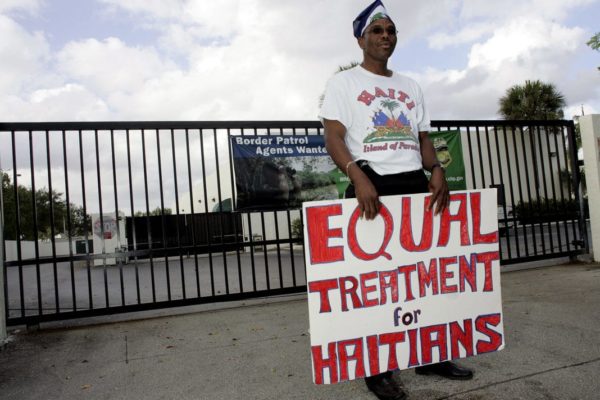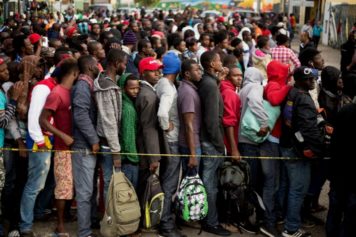
Dieuseau Pierrevil holds a sign in front of the Border Patrol office. Protesters want the Haitians to be allowed to stay in the U.S. although according to immigration rules, they are deported if arriving in the country illegally. (Photo by Joe Raedle/Getty Images)
Since 2012, Denea Joseph has been protected by the Deferred Action for Childhood Arrivals (DACA) program, which, since being initiated by an executive order from President Barack Obama in 2012, has shielded almost 800,000 undocumented young people brought to the U.S. by their parents from deportation.
But despite his declarations of support for the “Dreamers,” President Donald Trump announced on Sept. 5 last year that he was ending the program. Since then, Joseph said, the lives of people like her has been thrown into disarray.
“People are scared,” said Joseph, communications director for UndocuBlack, an organization of current and former undocumented people of African descent who are creating safe spaces while publicizing, advocating and lobbying for this often overlooked group. “There is mass hysteria to organize and mobilize for resources and aid.”
As a person of African descent who falls into the undocumented category, Joseph said, the challenges are far greater than for other immigrants.
“I sit at the intersection of being a black, undocumented, immigrant woman,” she said. “For people like me, if we’re not criminalized, we’re marginalized. We’re in a constant state of survival while pushing for representation and being seated at the table when these decisions are being made.”
U.S. Senator Kamala Harris (D-CA), whose has the most Dreamers in the country, criticized the administration for turning its back on these young people.
“They’re terrified, absolutely terrified,” she told MSNBC Host Rachel Maddow during a Jan 12 interview. “They come up to me and break out in tears. They’re afraid of being separated from their families and been sent back to a country they don’t know.”
But Trump has reneged on every promise made, she asserted and has left the approximately 800,000 DACA recipients unprotected, in legal jeopardy and vulnerable to deportation. Since September 5 15,000 Dreamers have lost their status, and every day, 122 more are left vulnerable.
Once this happens, Joseph said, these young people are no longer able to work, drive or take care of seemingly mundane day-to-day activities. Harris said politicians must stop playing with the Dreamers’ lives, and she called on Trump and her Congressional colleagues to create a “clean” Dream Act bill, which would offer young, undocumented immigrants a pathway to citizenship with no strings attached, a bill unencumbered by poison pills like building a wall, making changes to the visa diversity program, killing chain migration or other poison pills Democrats oppose.
Before Thursday, it was expected that Democratic and Republican negotiators, led by Sens. Lindsey Graham, Jeff Flake and Dick Durbin, would be able to hammer out an agreement before January 19, but some racist comments by Trump at a White House meeting on the afternoon of January 11, have cast doubt on whether that will happen.
Sen. Dick Durbin (D-IL) recounted the following morning that Trump, angered by the numbers of Blacks being allowed to enter the United States, had railed against the “shithole” nations in Africa and Haiti from which they’re coming.
Trump is said to have wondered aloud why more immigrants couldn’t come from countries like Norway.
“As Senator Graham made his presentation, the president interrupted him several times with questions and in the course of his comments said things which were hate-filled, vile and racist. I use those words advisedly. I understand how powerful they are,” Durbin told the media. “But I cannot believe in the history of the White House in that Oval Office any president has ever spoken the words I personally heard our president speak yesterday.”
Trump has endured withering widespread condemnation for his comments, but he has not apologized, rather, he instead has stood his ground because these statements appeal to his base.
Danyelle Solomon, director of Progress 2050 at the Center for American Progress, issued the following statement in response to the controversy: “As we reflect on the legacy of Martin Luther King, Jr., a man assassinated fighting for justice and equality, President Trump once again expressed racist and hateful comments about people of color,” she said. “Time and time again, whether it’s his rhetoric or his policy choices, the president has targeted people of color. From his degrading comments about former President Barack Obama’s birth certificate, to calling all Mexicans rapists, to validating white supremacists marching in Charlottesville, Virginia, as good people, President Trump has shown nothing but disrespect and disregard for people of color.”
Although the DACA program has the support of about 75 percent of Americans, since assuming office Trump has been particularly aggressive in pursuing an immigration agenda that has now been completely confirmed to be race-based. He and other Republican and administration hardliners have blamed immigration for America’s economic and social problems, and both as he campaigned and after becoming president he has employed fearmongering and scapegoating while appealing to his supporters’ racist, nativist and xenophobic tendencies.
The administration’s concept of overhauling America’s legal immigration system is all about reducing the numbers of those who will be allowed in. Republican new proposals would implement a “merit-based” immigration system in which individuals are selected based on their high level of education and relevant professional skills. At the same time, officials are making it clear that they are under no obligation to allow immigrants to enter or stay in the United States merely because their homes and families are already here.
So far, in its first year, the administration has reversed DACA, gone after Muslims with three attempts at a Muslim travel ban, rescinded the temporary protective status of more than 300,000 Haitians, Sudanese, Salvadorans and Nicaraguans, and suspended the U.S .refugee program for 120 days while sharply cutting the amount of refugees entering the country from 11 unnamed countries.
The administration has also given agents from Immigration and Customs Enforcement the green light to wage war on its perceived enemies. For the past several months, squads of officers from ICE have descended in force, spreading out into cities and suburbs including Brooklyn and Queens, New York, Austin, Texas, Los Angeles, California and Langley Park, Maryland. Armed with new powers, they’ve swept into the homes, living spaces and workplaces of undocumented immigrants, snatched them off of street corners, from businesses and restaurants, stopped them at roadblocks and checkpoints and unceremoniously taken men, women and young people into custody.
Since it was first announced on June 15, 2012, the Deferred Action for Childhood Arrivals (DACA) policy has provided temporary relief from deportation as well as work authorization to approximately 800,000 undocumented young people across the country. As research has consistently shown, DACA has not only improved the lives of undocumented young people and their families but has also positively affected the economy more generally, which benefits all Americans.
DACA has been unreservedly good for the U.S. economy and for U.S. society more generally. Previous research has shown that DACA beneficiaries will contribute $460.3 billion to the U.S. gross domestic product over the next decade — economic growth that would be lost were DACA to be eliminated.
Those opposed to Trump’s immigration policies, his attempts to implement Muslim bans and overall attacks against “the others” are producing resistance in the form of protests, rallies, sit-ins and demonstrations. During the Martin Luther King Jr. weekend, Haitians and other people of African descent held protests in Miami’s Little Haiti.
Washington labor activist Marc Bayard is a first-generation American of Haitian descent who has worked with trade unions, collectives and a range of black organizations in more than a dozen African nations.
“Trump has a [racist]toolbox that was built over decades. He seized all the tools in the arsenal,” said Bayard, a Fellow at the Institute for Policy Studies and director of the Black Worker Initiative. “He has no fear in using the full array of weapons, and we don’t have a counterbalance with Congress or the media. He has continued a drumbeat of attacking black people in the Middle East, Africa and Puerto Rico. His words weren’t hurtful but were jarring to people of color. His behavior is pretty consistent. It’s sad. Sad. And I think people are becoming desensitized.
“We have an election this year. If people weren’t more utterly motivated, this should do it. There is need for ongoing protest, making our voices heard and voicing concerns to the media for posterity. Documenting what we believe is extremely important. We have to keep in touch, rally around folks from Latin America, the Caribbean and the Middle East, supporting and protecting each other because we’re in a very fragile state.”
Fellow Haitian-American Karine Jean-Pierre echoed Bayard’s concern that the problem isn’t that Trump is a racist but that he is implementing policies imbued with deeply nativist, anti-black, anti-immigrant, xenophobic sentiment.
“That racism underlies this administration’s thinking on immigration is thoroughly unsurprising. Donald Trump’s legacy is not simply speckled with incidents of racism; it itself is racist,” said Jean-Pierre, a former Obama aide, political campaign organizer and activist in a Jan. 12 Common Dreams article. “Donald Trump entered the business world as a racist, he entered the 2016 election as a racist, and he entered the White House as a racist.”
“It’s also not surprising he said so in the context of immigration policy discussions,” continued Jean-Pierre, senior adviser and national spokeswoman for MoveOn.org. “Because just as Trump’s racism is intrinsic to who he is as a person, it too is embedded in his policy choices, from his attempts to implement a somewhat limited version of the Muslim ban he promised, to his insistence on building a wall on the border with Mexico as part of any immigration reform. The only thing that differentiates Trump from many of his Republican allies is that he is willing to name the source of his motivations aloud, and often in public.”


